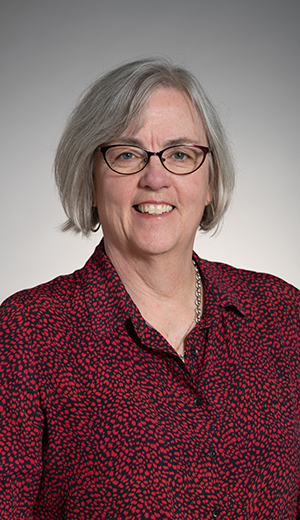
From a young age, Dr. Claire Betker [BN/77] felt called to the nursing profession. She was captivated by stories of her maternal grandmother, a registered nurse whom neither she nor her mother ever had a chance to know.
“My grandmother died when my mother was 18 months old, in Saskatchewan, from a work-acquired infectious disease: tuberculosis,” she says. “Her story and her ultimate sacrifice inspired me to consider following in her footsteps.”
Betker grew up minutes away from UM, and her parents strongly encouraged her to study there. Dr. Helen Glass [Cert.Nurs.(T&S)/58], dean of what was then the School of Nursing, became an-other major influence.
“She talked passionately about nursing’s role in addressing the upstream conditions that give rise to health, such as adequate income, access to education, clean water and belonging to a safe and vibrant community – all factors that lie outside of the formal health system,” the alumna recalls.
Betker’s career has largely focused on ad-vancing health equity through public health lead-ership. In 2019 she became scientific director of the National Collaborating Centre for Determinants of Health, hosted at St. Francis Xavier University in An-tigonish, N.S. She currently works remotely from Winnipeg.
“One of our key projects is our initiative to support public health professionals and organiza-tions to use an equity approach in their emergency response and recovery,” she says. “This is super-im-portant in the COVID-19 pandemic.”
Early in her career, Betker and her husband lived in Souris, Man. As the public health nurse for the area, she provided care for about 5,000 people. She worked in southwestern Manitoba for more than 15 years before moving on to a number of prominent leadership roles.
One of her most notable was as national co-or-dinator at the Public Health Agency of Canada. There she led a team that developed the Core Com-petencies for Public Health in Canada, released in 2008.
Betker, who holds two advanced nursing degrees – a master’s from the University of Calgary and a PhD from the University of Saskatchewan – was active in the formation of the Association of Regulated Nurses of Manitoba and was its first chair in 2015. That, in part, led to her role as president of the Canadian Nurses Association from 2018 to 2020.
Professional associations, she says, give nurses the opportunity to contribute their knowl-edge and experience to advocate for change. “Through these organizations, nurses are able to influence policy, strategy and resource allocation decisions at the highest levels.”
Betker says watching nurses across Canada “answer the call” to lead and deliver care through-out the pandemic has made her appreciate even more how important nurses are to the health and well-being of people and communities.
“We had a ceremony where we inducted fel-lows into the Canadian Academy of Nursing last fall, and I had tingles for over an hour. The depth and breadth of highly educated, skilled, intelligent and accomplished nurses in this country would blow you away.”
The mother of five and grandmother of three has two daughters who are UM-educated nurses. Both have pursued master’s degrees.
“I’m very proud of the leadership and care they’re providing during these really difficult times,” she says.
BY ALAN MACKENZIE
